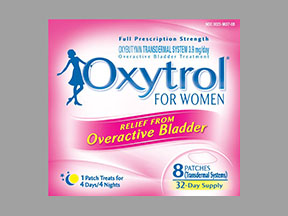
Oxytrol For Women Coupons & Savings Card – Discount Prices from $2.59
My prescription
Edit
3.9MG/24HR, Oxytrol For Women (1 Patch Twice Weekly)
Select pharmacy

Albertsons
$2.59
COUPON PRICE
Walgreens
$2.59
COUPON PRICEOxytrol For Women savings card
Show this card to your pharmacist
Albertsons
$2.59
BIN
ID
PCN
GRP
011867
LH328B9B80
HT
LABH001
Powered by
More prescriptions for overactive bladder
More prescriptions for overactive bladder
Price history for Oxytrol For Women
1 Patch Twice Weekly, 3.9MG/24HR
Average retail price for Oxytrol For Women
Average SaveHealth price for Oxytrol For Women
Our price history data is based on aggregated prescription data collected from participating pharmacies in America. Our prescription data updates daily to reflect the latest price changes. If you notice a missing data point, it means there wasn't sufficient data available to generate a monetary value for that date.
*Retail prices are based on pharmacy claims data, and may not be accurate when we don't have enough claims.
Oxytrol For Women dosage forms
Dosage Quantity Price from Per unit 3.9MG/24HR 1 Patch Twice Weekly $4.58 $4.58 3.9MG/24HR 4 Patch Twice Weeklies $12.30 $3.08 3.9MG/24HR 8 Patch Twice Weeklies $22.60 $2.83
| Dosage | Quantity | Price from | Per unit |
|---|---|---|---|
| 3.9MG/24HR | 1 Patch Twice Weekly | $4.58 | $4.58 |
| 3.9MG/24HR | 4 Patch Twice Weeklies | $12.30 | $3.08 |
| 3.9MG/24HR | 8 Patch Twice Weeklies | $22.60 | $2.83 |
Why was Oxytrol taken off the market?
Oxytrol was not taken off the market. It is still available, but the over-the-counter version for women, Oxytrol for Women, was discontinued in 2020 due to business reasons, not safety or efficacy concerns. The prescription version remains available for both men and women.
Can I get Oxytrol over-the-counter?
Yes, Oxytrol for Women is available over-the-counter. It is a patch used to treat overactive bladder in women. However, the prescription version is still available for men and women through a healthcare provider.
What are the side effects of Oxytrol for Women?
Oxytrol for Women, which contains the active ingredient oxybutynin, may cause several side effects. Common side effects include dry mouth, constipation, dizziness, drowsiness, and headache. Some individuals may also experience blurred vision, dry eyes, or difficulty urinating. Less common but more serious side effects can include severe allergic reactions, confusion, hallucinations, or difficulty breathing. It is important for individuals to consult with a healthcare provider if they experience any severe or concerning symptoms.
Who should not use Oxytrol?
Oxytrol should not be used by individuals who have urinary retention, gastric retention, uncontrolled narrow-angle glaucoma, or hypersensitivity to oxybutynin or any component of the product. Additionally, it should be used with caution in individuals with certain medical conditions such as liver or kidney disease, gastrointestinal disorders, or myasthenia gravis. Pregnant or breastfeeding women should consult their healthcare provider before using Oxytrol. It is important to follow a healthcare provider's guidance regarding its use.
Is Oxytrol still available?
Yes, Oxytrol is still available. It is an over-the-counter medication used for the treatment of overactive bladder in women.
